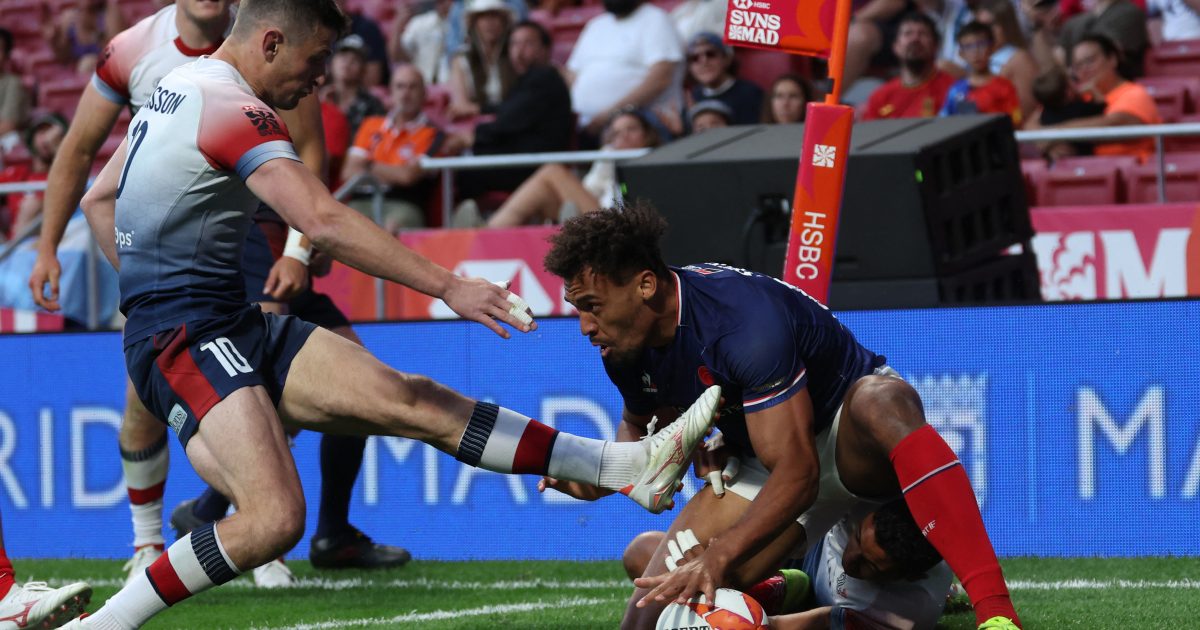HSBC SVNS 2024 Masculin : Fidji, Argentine, France et Nouvelle-Zélande dans le dernier carré

L’espoir de devenir champion du HSBC SVNS 2024 est toujours présent pour les Fidji, l’Argentine, la France et la Nouvelle-Zélande, qui s’affronteront en demi-finale le dimanche 2 juin. Malgré un début de saison difficile, les Fidji ont remporté leurs trois matchs à Madrid, offrant certaines de leurs meilleures performances de la saison dans des matchs palpitants contre la Nouvelle-Zélande et l’Irlande.
L’Argentine a également retrouvé sa forme après trois tournois en-deçà, restant invaincue à Madrid après avoir battu la France et l’Australie pour prendre la tête de la poule A. Elle affrontera la Nouvelle-Zélande dimanche, tandis que les Fidji joueront contre la France.
Dans les play-offs du HSBC SVNS masculin, nous sommes assurés d’avoir deux nouveaux visages dans la série la saison prochaine, puisque les quatre équipes du SVNS 2024 s’affronteront dans les finales de qualification, avec les États-Unis face aux Samoa et l’Espagne face au Canada.
HSBC SVNS Masculin
Poule A
L’Argentine, en battant la France et l’Australie, a assuré sa place en tête de la poule A à Madrid. Une avance de 14-0 en première période contre la France, suivie de deux autres essais en seconde période, leur a permis de s’imposer 26-12. Contre l’Australie, l’affrontement a été plus serré, les Argentins remontant un retard de 5-0 à la mi-temps grâce à des essais de Santiago Alvarez et Matteo Graziano pour s’imposer 14-5.
La France, ayant besoin d’une victoire pour se qualifier pour les demi-finales, a battu le Royaume-Uni lors de son deuxième match, mais a dû aller en prolongation. Après une bataille acharnée et un score de 12-12 à la fin du temps réglementaire, la vitesse de Nelson Epée sur l’aile gauche a permis à la France de briser les espoirs de la Grande-Bretagne.
Pour la Grande-Bretagne, c’était une deuxième défaite serrée de la journée, après un 19-14 contre l’Australie, Ben Dowling marquant l’essai décisif à la dernière minute. Les deux équipes étaient à égalité 7-7 à la pause, mais une mêlée en fin de rencontre a permis à l’Australie de remporter le match.
Poule B
Les Fidji ont dominé l’Irlande dès le début, avec des essais de Joji Nasova et Jerry Tuwai en première mi-temps, leur donnant une avance de 14-7 à la pause. Les Fidji ont conservé leur avantage jusqu’à la fin, avec un essai de Terio Veilawa permettant à Naduvalo de marquer, malgré un essai de Jordan Conroy pour l’Irlande, égalisant le score grâce à la transformation d’Hugo Lennox. Naduvalo a ensuite marqué son deuxième essai dans le coin droit pour assurer la victoire des Fidji.
Lors de leur deuxième match, les Fidji ont battu l’Afrique du Sud 26-7, transformant une avance de 21-0 à la mi-temps en une victoire décisive, et se qualifiant pour les demi-finales.
Après des défaites contre les Fidji et l’Irlande lors de la première journée, la Nouvelle-Zélande et l’Afrique du Sud se sont affrontées dans un match crucial remporté par les All Blacks Sevens dans les derniers instants grâce à un essai de Moses Leo. La Nouvelle-Zélande menait 14-10 à la mi-temps, mais l’Afrique du Sud a pris l’avantage à une minute de la fin grâce à un essai de Quewin Nortje. Les All Blacks Sevens sont restés patients, et après l’essai de Leo, Akuila Rokolisoa a ajouté un dernier point.
Le suspense ne s’est pas arrêté là pour la Nouvelle-Zélande, qui a dû recourir à une action de dernière minute pour battre l’Irlande et se qualifier pour les demi-finales. Hugo Keenan a donné une dernière chance à son équipe, mais Regan Ware a brisé les espoirs irlandais.
Barrage HSBC SVNS Masculin
Poule A
Les États-Unis ont remporté un match serré contre leurs adversaires nord-américains, le Canada, 14-7, assurant leur place en tête du classement et condamnant le Canada à trois défaites dans la poule de Madrid. Josiah Morra a égalisé pour le Canada à quatre minutes de la fin, mais Malacchi Esdale a assuré la victoire des États-Unis, leur offrant une place en demi-finale contre les Samoa.
Par ailleurs, l’Uruguay a marqué quatre essais pour s’imposer 26-14 face à l’Allemagne, préparant ainsi sa demi-finale contre le Chili.
Poule B
Le Kenya a battu le Chili 36-7 dans son dernier match de la poule et retrouvera l’Allemagne pour tenter de retrouver sa place dans les Series l’année prochaine. Pendant ce temps, l’Espagne s’est imposée 31-0 face aux Samoa, mais devra se défaire du Canada pour rester une équipe titulaire.


